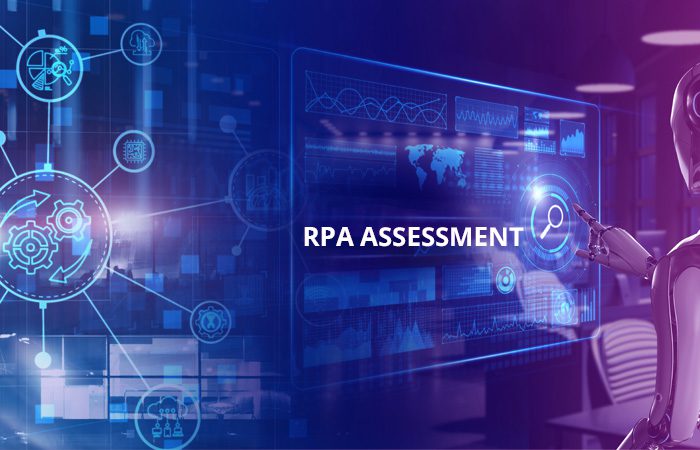
The Crucial Role of RPA Assessment and Choosing a Reliable Service Provider
In this dynamic business landscape, where agility and efficiency are paramount, Robotic Process Automation (RPA) has emerged as a transformative force. RPA is not merely a technological advancement; it’s a strategic imperative for organizations looking to streamline operations, enhance productivity, and stay competitive in the digital era. To embark on this transformative journey, organizations must first recognize the critical importance of RPA assessment and carefully select a reliable service provider.
Let’s take a look at the importance of RPA assessment and how a reliable service partner can make all the difference.
Understanding RPA Assessment
Robotic Process Automation involves the use of software robots or “bots” to automate repetitive, rule-based tasks within business processes. These bots emulate human actions, interacting with digital systems to execute tasks such as data entry, invoice processing, and customer support. However, implementing RPA without a thorough assessment can lead to suboptimal results and hinder the realization of its full potential.
The Purpose of RPA Assessment
Process Understanding:
A comprehensive RPA assessment begins with a deep dive into existing business processes. This involves understanding the intricacies of each process, identifying repetitive and rule-based tasks, and evaluating the potential for automation. By mapping out these processes, organizations gain a clearer picture of where RPA can be most beneficial.
Feasibility Analysis:
Not all processes are equally suitable for automation. RPA assessment involves evaluating the feasibility of automating specific tasks by considering factors such as rule complexity, data variability, and transaction volumes. This analysis ensures that organizations invest in automation where it will yield the maximum return on investment.
Risk Identification:
Every business process carries inherent risks. RPA assessment includes a meticulous risk analysis to identify potential pitfalls and challenges associated with automation. By addressing these risks proactively, organizations can mitigate the chances of disruptions and ensure a smoother RPA implementation.
Technology Alignment:
Assessing the existing technology landscape is crucial to ensure seamless integration with RPA solutions. Compatibility with existing systems, data security, and scalability are key considerations during the assessment phase. This alignment ensures that RPA becomes an integral part of the organization’s digital ecosystem.
The Importance of RPA Assessment
Optimizing ROI:
RPA is an investment, and like any investment, organizations seek a positive return. Through a meticulous assessment, organizations can pinpoint the processes that offer the highest ROI when automated. This targeted approach ensures that RPA implementation delivers tangible and swift results, optimizing the overall return on investment.
Minimizing Disruption:
Change, even positive change, can disrupt established workflows. RPA assessment helps organizations identify potential areas of disruption and formulate strategies to minimize it. By understanding the impact of automation on people, processes, and technology, organizations can proactively address concerns and ensure a smooth transition.
Enhancing Scalability:
Scalability is a key factor in any successful automation initiative. RPA assessment considers the scalability of automated processes to accommodate future growth and increased workloads. This forward-looking approach ensures that RPA solutions can evolve with the organization, adapting to changing business dynamics.
Ensuring Regulatory Compliance:
In industries with stringent regulatory requirements, compliance is non-negotiable. RPA assessment includes a thorough review of regulatory considerations to ensure that automated processes adhere to industry standards and compliance requirements. This not only mitigates legal risks but also enhances the organization’s reputation for integrity and responsibility.
The Imperative of Choosing a Reliable Service Provider
Once the decision to embrace RPA has been made, the next crucial step is selecting a reliable service provider. The success of an RPA implementation is often contingent on the expertise and capabilities of the chosen partner. Here are compelling reasons why opting for a reliable service provider is imperative:
- Specialized Expertise:
RPA is a specialized field that requires a deep understanding of both technology and business processes. Reliable service providers bring expertise in RPA tools, methodologies, and best practices. Their specialized knowledge ensures that organizations benefit from a well-informed and effective automation strategy.
- Proven Track Record:
Trust is built on a track record of success. Reliable service providers typically have a portfolio of successful RPA implementations in diverse industries. Case studies, testimonials, and references offer insights into their ability to deliver tangible results. Choosing a partner with a proven track record reduces implementation risks and instills confidence in the automation journey.
- Comprehensive Support:
RPA implementation is not a one-time event; it’s an ongoing process. Reliable service providers offer comprehensive support throughout the automation lifecycle. From the initial assessment to deployment, maintenance, and continuous improvement, a reliable partner is committed to ensuring the success and sustainability of RPA initiatives.
- Scalability and Flexibility:
Organizations evolve, and so should their RPA solutions. Reliable service providers design solutions that are scalable and adaptable to changing business requirements. Whether it’s expanding automation to new processes or integrating with emerging technologies, a reliable partner ensures that RPA remains aligned with the organization’s growth trajectory.
- Training and Change Management:
Successful RPA implementation involves more than just deploying bots. It requires a cultural shift within the organization. Reliable service providers offer training programs and change management support to equip employees with the skills and mindset needed to embrace automation. This proactive approach accelerates adoption and minimizes resistance to change.
- Security and Compliance Assurance:
Data security and compliance are paramount in the digital age. Reliable service providers prioritize security measures, ensuring that RPA solutions adhere to industry standards and regulatory requirements. By choosing a partner with a robust security framework, organizations can confidently deploy RPA without compromising sensitive information.
- Cost-Efficiency:
While RPA promises efficiency gains, cost-effectiveness is a critical consideration. Reliable service providers offer transparent pricing models and cost-benefit analyses, helping organizations understand the financial implications of automation. This transparency enables informed decision-making and ensures that RPA aligns with budgetary constraints.
- Continuous Innovation:
The technological landscape is ever-evolving, and RPA is no exception. Reliable service providers stay abreast of the latest advancements in automation technologies and continuously update their offerings. By partnering with an innovative provider, organizations can future-proof their RPA initiatives and harness the full potential of emerging technologies.
In the pursuit of operational excellence and digital transformation, Robotic Process Automation stands out as a game-changer. However, the journey towards successful RPA implementation begins with a thorough assessment that considers process intricacies, feasibility, risks, and technology alignment. Equally critical is the choice of a reliable service provider, as their expertise, track record, and commitment play pivotal roles in the success of RPA initiatives.
As organizations navigate the complexities of RPA adoption, the synergy between meticulous assessment and a trusted service provider becomes the linchpin of success. Embracing RPA is not just about automating tasks; it’s about redefining how work is done, unlocking new levels of efficiency, and positioning the organization for sustained growth in the digital age. With the right assessment and a reliable partner by their side, businesses can confidently embark on a transformative journey towards a future where automation is not just a tool but a strategic advantage.


